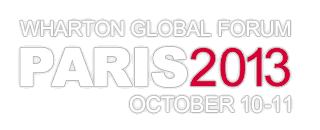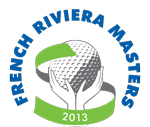Schedule Day 3 - Friday, October 11, 2013printer friendly version
*Dress Code: Business Casual for Forum. Business Suit for Thursday and Friday dinners.
| Time & Location | Event |
|---|---|
| 7:30 AM - 8:00 PMWestin Paris Vendome | Registration Desk Open Westin Paris Vendome |
| 7:45 AM - 8:30 AMSalon Aiglon | Wharton Women`s Breakfast Join us for this facilitated networking breakfast session where you will meet other women from Wharton. This is an opportunity to cultivate a network of peers. It is also a chance to discuss the challenges and opportunities that women encounter in the business world. Learn from the wisdom of other alumnae, while making new friends and professional contacts. This session will feature Georgette Chapman Phillips, Vice Dean for Technology Enhanced Learning, as the faculty facilitator. Please sign up for this event onsite at the Wharton Booth located in the Jardin D`Hiver. |
| 7:45 AM - 8:30 AMNapoleon/Jardin D`Hiver | Welcome Coffee |
| 8:30 AM - 10:15 AMSalon Concorde | Morning Plenary |
Dean`s State of the SchoolThomas S. RobertsonDean, The Wharton School, University of Pennsylvania, Philadelphia | |
World Economy and Markets: Where Do We Go From Here?Session DescriptionJeremy SiegelRussell E. Palmer Professor of Finance, The Wharton School This keynote session covers the major economic forces shaping the US and European economies, Exchange Rates, and financial markets. | |
| 10:15 AM - 10:30 AMNapoleon/Jardin D`Hiver | Coffee Break |
| 10:30 AM - 12:00 PM | Lifelong Learning Master Classes led by Wharton Faculty |
| Salon Vendome | Mind the Talent Gap: Why Some Startup Management Teams Succeed, and Why Some FailClass DescriptionLaura HuangAssistant Professor, The Wharton School Founding team and management team issues are often cited as one of the primary reasons that new start-ups fail. Assembling the team is an early challenge, but even with the right mix of skills and team members, many issues may arise due to differences in experience, perspectives, functions, and even generational gaps. This session addresses such gaps between team members, specifically in the context of launching an entrepreneurial start up. |
| Salon Tuileries 1 | The Euro Crisis: Challenges and OpportunitiesClass DescriptionRichard MarstonJames R.F. Guy Professor of Finance, The Wharton School Certainly, there are numerous successes that can be attributed to the introduction of a common currency in the European Union - simplification of cross-border trade, increased price transparency, integration of capital markets, convergence of interest rates, and a reduction of the costs of capital. However, experts also point to failures - disparate unit labor costs and competitiveness, fiscal divergences that are inconsistent with the common currency, and increasingly divergent economic performance. Is the euro crisis a symptom of a larger disease afflicting most industrial countries? Is there a common theme that spans recent fiscal crises? How do countries cope with rising pension costs, increasing taxation, and aging populations? How do firms cope with these issues? Does the crisis provide new opportunities for reform? This master class will examine these and other issues that impact not only the financial stability of countries within the EU, but the world at large. During this class, attendees will explore the pros and cons of potential solutions to the crisis - austerity and internal devaluation, debt restructuring, "Full Argentina," and fiscal union - and one alternative to these solutions: muddling along. |
| Salon Castiglione | Climate Contracts & Policy Regulation on Greenhouse GasesClass DescriptionEric W. OrtsGuardsmark Professor; Professor, Legal Studies and Business Ethics and Management, Director, Initiative for Global Environmental Leadership, The Wharton School Many policymakers and academics argue that a comprehensive global treaty is the only effective method by which to regulate greenhouse gas emissions. Some of them therefore see the failure to reach a post-Kyoto agreement at Copenhagen in 2009 as "catastrophic." This master class will illustrate that the Copenhagen Accord and the negotiations surrounding it reveal some inherent limits to the comprehensive approach. It will elaborate on a number of pitfalls in any comprehensive solution, including "leakage" in economic production and distribution, weaknesses in disclosure and monitoring, limited methods of enforcement, constrained incentives for compliance, and other factors. As an alternative, this discussion will propose that comprehensive global agreements should recognize that a plurality of lower-level "climate contracts" of various kinds are likely to provide effective and efficient responses to climate change in the long run. |
| Salon Tuileries 3 | Negotiating in Teams (PART 2 OF 2)Class DescriptionMaurice SchweitzerCecilia Yen Koo Professor, Professor of Operations and Information Management, The Wharton School The session begins with a short lecture on social capital theory, followed by an interactive exercise in which each participant applies the concepts presented in an exercise that focuses on asking one another for specific help. These requests can be about anything that matters - from developing a new business idea to discovering better child-rearing methods, and everything in between. Others ask clarifying questions with the intent of discovering how they can provide help in response, either directly or indirectly, to the request. Then each participant writes a note about how he or she can help each and every other participant. We then debrief this very practical exercise and draw insights about how to build one`s reputation as a leader and increase social capital by contributing to the success of other people, followed by a closing lecture on practical tips for diagnosing and cultivating one`s network. Please note that this session is taught in two 90-minute sessions. This is the second of the two sessions. |
| Salon Concorde | Creating the Creative OrganizationClass DescriptionJerry WindLauder Professor, Director, SEI Center for Advanced Studies in Management; Academic Director, The Wharton Fellows Program, The Wharton School The increasingly complex and uncertain environment, the enormous advances in technology, and the associated increase in the segments of empowered consumers require creative leadership. This was clearly recognized in the IBM Global CEO study in which creative leadership, rethinking consumer relationships, and agile operations were the characteristics that best distinguished between successful and unsuccessful companies. Creative leadership requires the creation of a creative organization. This session will outline and provide hands-on experience in understanding 10 principles for creating a creative organization. Each participant will develop a plan for experimentation in the creation of a creative organization. |
| 12:00 PM - 12:45 PMSalon Concorde | Afternoon Plenary |
Bolstering Economic Value through Education and InnovationDescription | |
Moderator:John KimberlyHenry Bower Professor of Entrepreneurial Management, Executive Director, Wharton/INSEAD Alliance, The Wharton School | |
Speakers:Valerie PecresseFormer Minister for the Budget and Government’s Spokesperson, Former Minister for Higher Education, Government of France | |
| Louis Schweitzer Chairman of the French Foreign Affairs Council, Special Representative of the French Minister of Foreign Affairs for the Franco-Japanese Partnership, President of France Initiative | |
| 12:30 PM - 1:30 PMSalon Imperial | Lunch |
| 1:45 PM - 5:00 PMWestin Lobby | Meet Paris Tours The Global Forum is organized for you to "Meet Paris" on Friday afternoon. Several vibrant options have been established to give you an insider`s look at the art and culture of the world`s most romantic city. Space is limited, so be the first to sign up onsite in Paris at the Wharton Booth, located in the Winter Garden of the Westin Paris Vendome. For more information, please visit During the Forum . |
| 7:30 PM - 10:30 PMSalon Imperial | Farewell Gala Banquet |

























